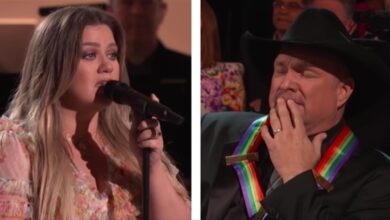Though it’s been around for 50 years, this Elvis song still outshines today’s music
“Can’t Help Falling in Love” stands as a remarkable testament to the power of love songs, weaving its way into the hearts of listeners around the world since its introduction in 1961. The song’s rich history ties closely to its origin in the context of Elvis Presley’s “Blue Hawaii.” The cinematic allure of Hawaii provided the perfect backdrop for a love ballad that would come to symbolize romantic devotion. The collaboration between songwriters Hugo Peretti, Luigi Creatore, and George David Weiss resulted in a composition that paired haunting melodies with poignant lyrics, encapsulating a universal sentiment that many experience at some point in their lives.
The essence of the song lies in its portrayal of love’s inevitability. By expressing the idea that one cannot resist falling in love, the lyrics reflect a vulnerability that resonates deeply with listeners. This theme of surrendering to emotions, despite the potential risks involved, creates a connection that is both intimate and relatable. Presley’s interpretation amplifies this connection, as his expressive vocal delivery bridges the gap between the lyrics and the listener’s personal experiences. His nuanced performance evokes a spectrum of emotions, from joy to melancholy, capturing the highs and lows of love beautifully.
Musically, “Can’t Help Falling in Love” employs a simple yet captivating structure. The arrangement is characterized by a gentle waltz rhythm that enhances its romantic feel. The lush orchestral backing complements Presley’s vocals, adding layers of depth to the listening experience. This carefully crafted musicality allows the song to evoke strong feelings without overwhelming the listener, making it the perfect accompaniment for a variety of romantic occasions, such as weddings, anniversaries, and intimate moments.
The song’s influence has only grown over the decades, transcending its original context to become a timeless classic. It has been featured in a multitude of films and television shows, resonating with new generations who might not have been familiar with the original work. Its appearances in popular culture have redefined its meaning, allowing it to be interpreted in various ways depending on the setting, from tender first dates to heart-wrenching goodbyes.
As a pioneering figure in the music industry, Elvis Presley significantly shaped the landscape of popular music. Known as the “King of Rock ‘n’ Roll,” his fusion of various musical genres brought unprecedented change to American culture. Presley’s early life in the South greatly influenced his musical style, combining elements of gospel, blues, and country. He broke barriers, paving the way for artists of diverse backgrounds, and his passion for music set a new standard for future generations.
In addition to his remarkable vocal capabilities, Presley’s charisma and stage presence have contributed to his enduring legacy. His energetic performances and signature moves captivated audiences, making a lasting impression on pop culture. The emotional weight he brought to songs like “Can’t Help Falling in Love” established him as not just a performer, but as a storyteller who could convey profound emotions through his music.
Moreover, the song’s adaptability is underscored by the multitude of covers it has spawned over the years. From Andrea Bocelli’s powerful renditions to UB40’s reggae adaptation, each version pays homage to Presley’s original while infusing new life into the song. These interpretations serve to broaden its appeal, ensuring that its message of love continues to resonate with fans across diverse musical tastes and cultural backgrounds.
Thematic exploration within “Can’t Help Falling in Love” also delves into the complexities of romance. The lyrics capture the dual nature of love, celebrating its beauty while acknowledging its unpredictability. This reflection on love’s vulnerability is particularly impactful, reminding listeners that confinement is not a feature of true affection. The song invites individuals to embrace their feelings, even when faced with uncertainty, creating a shared experience among those who listen.
Elvis’s ability to infuse authenticity into his music shines through in this ballad. The sincerity with which he performed translates to an emotional experience for listeners. “Can’t Help Falling in Love” is more than a hit song; it is a reflection of profound human emotions that resonate across time and borders, reinforcing the notion that love is a powerful force that connects us all.
As we look toward the future, the legacy of “Can’t Help Falling in Love” remains secure. It stands as a pillar in the realm of romantic music, a piece that has withstood the test of time and continues to find its place in the fabric of our collective memory. Each new generation that discovers the song adds to its ongoing story, ensuring that its message of love and longing continues to inspire and uplift for years to come.
In essence, “Can’t Help Falling in Love” encapsulates Elvis Presley’s enduring impact on music and culture. The song serves as a reminder that the experiences of love, with all their intricacies and unpredictability, remain at the heart of human connection. As a work of art, it offers a unique blend of emotion and musical craftsmanship that stands as a tribute to the complexity of love itself—an experience that ultimately unites us all.





